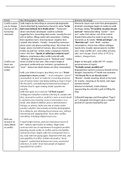Interview
Notes for AQA English Literature Poetry (Power and Conflict)
- Course
- Institution
These notes are a complete summary of everything you have to remember for the English literature AQA exam on comparing poetry from the Power and Conflict cluster, and allowed me to get a grade 9 in the GCSE.
[Show more]



